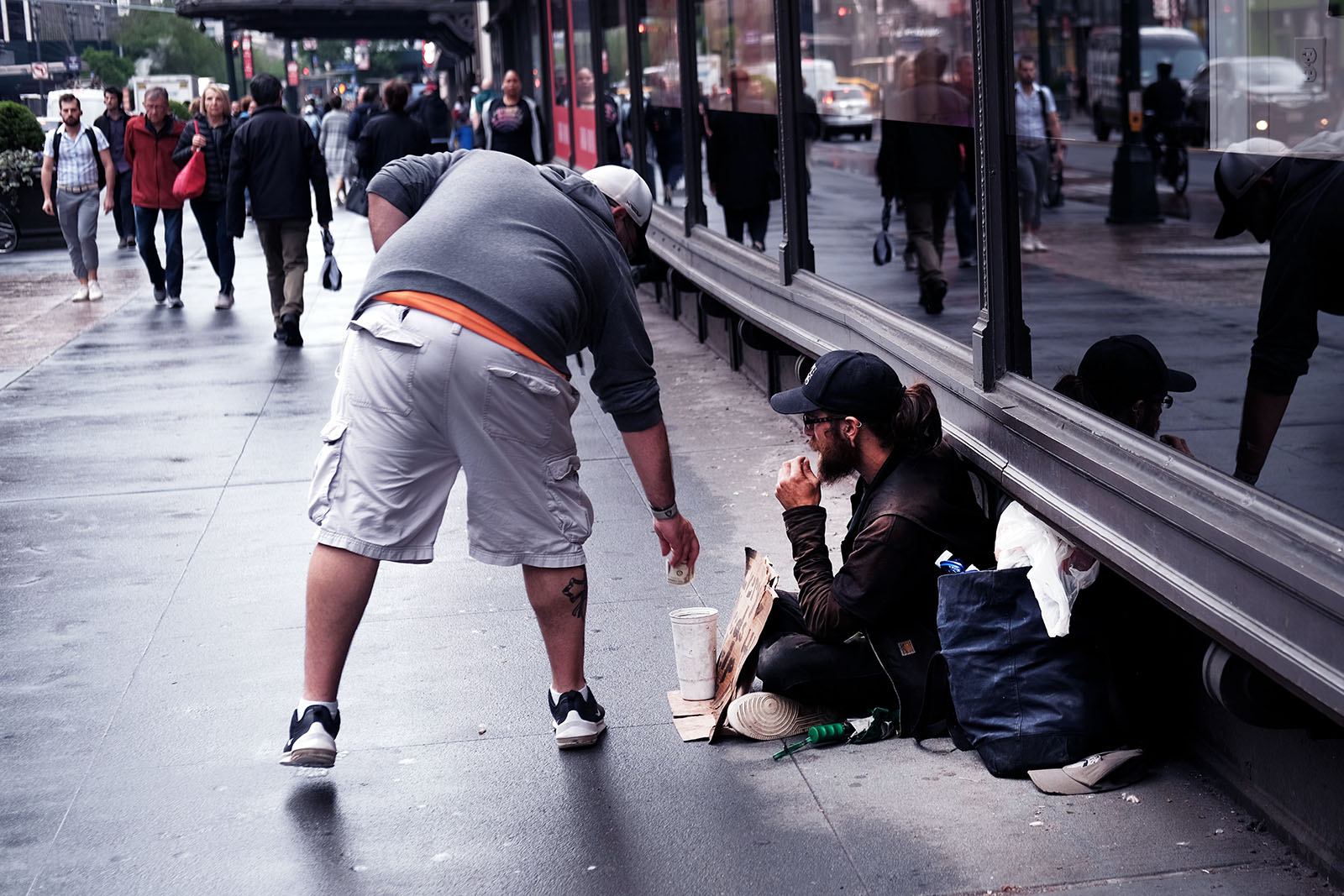Do Direct Cash Transfers Work?

A passerby gives money to a person who identifies as homeless on a sidewalk in New York City. A study suggests that cash transfers could be an effective approach to reduce homelessness.
Photo: Spencer Platt/Getty Images
The concept of direct cash transfers has become widely discussed by economists during this economic recession. One study in Canada gave a single cash transfer to homeless people in Vancouver and followed their spending habits for a year.
They found that the transfers created net savings for local authorities, by reducing the need for emergency services. The study was piloted by Claire Williams, CEO of Foundations for Social Change and professor Jiaying Zhao of the University of British Columbia.
WILLIAMS: This was a randomized control trial, in which we gave $7,500 to 50 people who had become recently homeless. Direct cash transfers are a simple intervention, which involves the disbursement of a one-time lump sum to empower people to move forward in their lives.
Improvements After One Month
We screened people based on the degree of functionality, so we screened out anybody who had significant issues with substance use, alcohol use and mental health challenges. That’s not to say an intervention like this couldn’t work for that population, but we wanted to start small and safe and then expand our parameters as we move forward. We also had a control group in order to assess the impact of our intervention.
BRINK: Did you compare it to other direct cash transfer studies that have occurred around the world, and did you find major differences?
ZHAO: We first did a thorough review of the existing cash transfer studies out there and compared our findings with theirs. There are several significant differences. We saw improvements one month after the cash transfer in housing stability, food security, subjective well-being, cognitive function, savings, assets, and slight improvements even in employment, and finally cost savings for society.
Because we only recruited people who passed our screening criteria, we have no data on whether this approach would work for other populations as well, but our findings suggest that this could be an effective approach to reduce homelessness.
A Saving for Governments
BRINK: What do you mean by cost savings to society?
ZHAO: We looked at the social and health services that the participants accessed over 12 months for both the cash participants and the non-cash control group. What we found was that over one year, cash participants created a savings of $8,100 through reduced reliance on shelter use. So there was approximately a net savings of $600 per person per year.
This study shows that when provided with the opportunity, people can make wise choices and know specifically how to move their lives forward.
BRINK: Have you shared that discovery with local authorities?
WILLIAMS: We did report back to the government, who was one of our initial funders. I am hoping that we will see more interest in terms of collaboration and possible funding from the government. I do believe that ultimately, in Canada, it is the government’s responsibility to lift the income floor for all people. But until that time, we also strongly believe that it’s the responsibility of charity and philanthropy to drive forward meaningful risk-taking to advance social change.
BRINK: Is there a role for companies in this space?
WILLIAMS: I absolutely think there is. Neither myself nor Jiaying come from a space where we have worked with people who are experiencing homelessness. I was an environmental and sustainability consultant; Jiaying works in behavioral sciences and psychology. And yet, this has its advantages.
We’re really bringing lean business practices from the entrepreneurial space, from the academic space, and applying these ways of thinking, these paradigms, to an age-old problem. And I think that’s why we’re seeing the impact that we are, because we’re thinking more creatively and differently about the issue.
ZHAO: I think that our project is essentially about innovation. This is a highly innovative, disruptive solution to homelessness, and innovation is at the core of businesses. So I would invite businesses who are interested in working with us in advancing our expansions to reduce homelessness on a larger scale.
Helps People Plan for the Future
BRINK: What was the biggest surprise for you from this study?
WILLIAMS: We saw people making wise financial choices, with a 39% reduction of spending on drugs, alcohol and tobacco. That’s important in terms of challenging the prevailing stereotype and narrative around people living in poverty or people who are experiencing homelessness — that they’re going to “waste the money.”
This data point shows that that’s just not true. It shows that when provided with the opportunity, people can make wise choices and know specifically how to move their lives forward.
In British Columbia, you get $700 a month assistance, $375 of that is allocated to your housing, so you’re left with $300 and change. If I had $300 and change to get through the month, I’m probably going to look at ways to self-medicate because I can’t move into housing, and living in a shelter is an incredibly traumatic experience. And particularly if you’re a woman, you’re often exposed to violence, the threat of sexual violence. People use alcohol to stay warm, they smoke cigarettes to calm their nerves and they use substances to stay awake at night so that they aren’t at risk of violence.
So you are in survival mode when you have such a small amount of money. You can’t think about getting housing, you can’t think about taking a training course. Your thought process is on the immediate here and now, whereas the research shows if you give somebody a larger sum of money, it provides them with that stable foundation to move forward, to start thinking about their goals and aspirations and start planning for the future.







